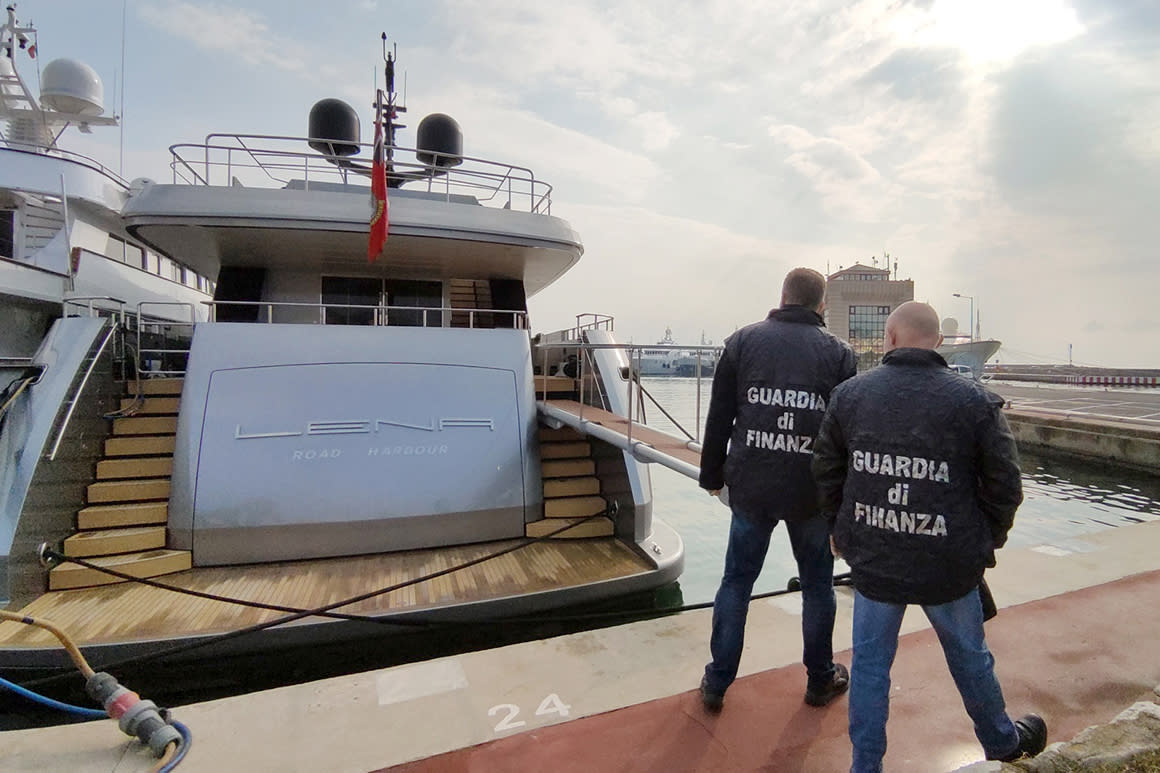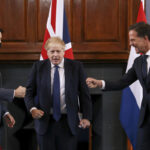
Vladimir Putin’s war in Ukraine has turbo-charged the anti-corruption cause in Washington, with lawmakers on the left and right calling for crackdowns on oligarchs close to the Russian leader who hide many of their assets in the West.
The Biden administration and its allies in Europe are obliging, unveiling sanctions on several of the Russian tycoons and, in at least one high-profile case, seizing a billionaire’s luxury yacht. They’re also launching task forces to go after Russian oligarchs, including one led by the U.S. Department of Justice with the moniker “KleptoCapture.”
“We are coming for your ill-begotten gains,” President Joe Biden warned the Russian billionaires during his State of the Union speech last week.
Anti-corruption activists, though, say that the government institutions charged with enforcing the crackdowns will need more money, staff and patience, not just applause. They also say the U.S. shouldn’t stop just with Russia’s corrupt elite.
When it comes to the assets of the oligarchs, “it’s going to be hard to get at. Nobody knows where everything is,” said Paul Massaro, a Capitol Hill staffer who has long pushed anti-corruption legislation. “We’ll need whistleblowers. We’ll need leaks.”
Nonetheless, the sudden surge of support for anti-corruption work is “a paradigm shift moment,” Massaro said. “I’m getting 100 calls a day from offices I’ve never worked with before who are like, ‘We want to go after oligarchs!’”
The gloves come off
Biden and his aides have long been laying the groundwork for this moment.
Even before he became president, Biden had warned that transnational corruption was a threat to democracy and that the United States needed to tighten up its laws to prevent dictators and their friends from exploiting, and even weaponizing, them.
He warned in particular about Russian elites laundering their funds through Western financial systems and using the money to influence politics in the United States and elsewhere. Many of those tycoons are suspected of holding billions in funds for Putin, who himself claims a modest income and lifestyle.
In his first few months as president, Biden declared that battling corruption was a core U.S. national security interest and directed federal agencies to develop plans to fight it. His administration also issued the first U.S. comprehensive government strategy to counter corruption, a well-received document among experts.
The overall anti-corruption campaign had been drawing support from both Republicans and Democrats months before Putin rolled his tanks into Ukraine. Some two dozen lawmakers have formed a congressional caucus and pushed bills that targeted corruption in sectors from art dealing to real estate to law.
But despite all its pronouncements, the Biden administration for months held off on imposing sanctions on the Russian billionaires close to Putin, resisting the pleas of Russian dissidents who drew up lists of names. When pressed, U.S. officials cited multiple reasons to avoid targeting the oligarchs, including that past such moves made some of those wealthy Russians even more dependent on the Russian state, meaning Putin himself.
The Russian autocrat’s full-scale invasion of Ukraine changed Biden’s calculus. In the days since Putin sent his forces into Ukraine — which he first invaded in 2014 — the Biden administration, as well as European allies, have sanctioned multiple Russian tycoons, with more likely to come.
Among those who now face asset freezes and potential seizures by the United States and European countries are: Yevgeniy Prigozhin, a powerful Russian businessman suspected of ties to the Wagner mercenary group and who’s been sanctioned before for alleged interference in U.S. elections; Alisher Usmanov, a leading metals and mining executive; and Sergei Chemezov, a top technology executive. The immediate relatives of several of the oligarchs, too, were sanctioned to prevent them from becoming vehicles for the main target’s riches.
“These individuals have enriched themselves at the expense of the Russian people, and some have elevated their family members into high-ranking positions,” the White House said in unveiling the penalties “Others sit atop Russia’s largest companies and are responsible for providing the resources necessary to support Putin’s invasion of Ukraine.”
Putin himself has been sanctioned, a rare move by Washington and its allies, who normally don’t target heads of state. His foreign minister, Sergey Lavrov, also faces asset freezes as part of the West’s sanctions rollout.
In terms of sheer impact, sanctions on the oligarchs and other individuals are not as powerful as the ones imposed on Russia’s central bank, sovereign debt and other penalties that have caused the ruble’s crash. Nonetheless, they are symbolically important.
“Russia provides essentially a case in point for the idea that kleptocratic regimes are inherently threats to stability,” a senior Biden administration official told POLITICO.
The official noted that Putin long ago made a deal with his country’s wealthy: Leave the politics to him and get richer. Now, the official said, “this single man has launched a war of choice that is leading to the death of thousands of people, and so the president has been super clear that those that profited from this deal are going to pay a price for it.”
What about China’s princelings?
Advocates of anti-corruption measures applaud the administration’s efforts, but say Russia should be simply the start. They also stress that it will take time for the task forces and other units devoted to tracking down oligarchs’ assets to make serious headway.
“China’s got to be in this conversation,” said Rep. John Curtis (R-Utah), one of the leaders of the congressional counter-kleptocracy caucus.
Not only do wealthy Chinese tycoons, who often stash their holdings in the West, help keep the Communist Party in power, but China has, in its own way, carried out an invasion in the past few years — of Hong Kong, Curtis said. Taiwan could be next.
The time to go after the so-called Chinese princelings is now, not later, Curtis and other anti-kleptocracy activists said. Given that Beijing is watching U.S. moves against Russia closely, many Chinese tycoons are likely already further hiding their assets.
Finding the riches of oligarchs has never been easy, note sanctions lawyers.
Many tycoons have hidden their funds in a vast network of companies under other people’s names or anonymously in ways that until recently were allowed by U.S. laws governing the ownership of firms. (The Biden administration is implementing new measures that require more disclosure of who owns companies, but it’s still a work in progress.) Some of the oligarchs have invested in American or European real estate in ways that have undermined local economies.
“It is important to block ostentatious objects of wealth, like yachts and mansions, but the hard work lies in proving beneficial ownership and blocking related accounts,” said Julia Friedlander, a former U.S. Treasury official. “This could take years.”
It will also require money and more staff at the array of task forces and offices who do such work, including within the Treasury and Justice departments.
One critical unit is Treasury’s Financial Crimes Enforcement Network, known as FinCEN, noted Gary Kalman, who directs the U.S. office of Transparency International. FinCEN’s duties include investigating money laundering and other crimes. But the unit, which says it has around 300 staff on its website, needs more money and employees to help gather data and track illicit activities, Kalman and other advocates said.
The White House is seeking new funds for the task forces and other relevant government bodies fighting corruption, the senior administration official said.
“We continue to ask the Congress for additional funds to make sure that FinCEN and [the Office of Foreign Assets Control] and the new DOJ task force are appropriately resourced,” the official said.
Many of the targeted oligarchs are likely to take the U.S. government to court, meaning there will be litigation costs, too. But the work can help fund itself, especially if the U.S. can, over time, lay claim to some of the tycoons’ funds. Sanctions generally lead to freezing assets, not seizing them. Seizures often involve using asset forfeiture laws, which will take more time and can be subject to legal pushback.
Caveats aside, anti-corruption activists say they are hopeful about the long-term impact of the actions the United States is taking against Russia now.
Simply setting up new structures, such as Task Force KleptoCapture, helps build knowledge and muscle memory within the government that can be applied against non-Russian entities. That includes getting a better handle on the role that cryptocurrency plays, which is one of the task force’s targets.
According to the Justice Department, the task force will be staffed with “prosecutors, agents, analysts, and professional staff across the department who are experts in sanctions and export control enforcement, anticorruption, asset forfeiture, anti-money laundering, tax enforcement, national security investigations, and foreign evidence collection.”
The task force will be expected to use an array of tools, including “data analytics, cryptocurrency tracing, foreign intelligence sources, and information from financial regulators and private sector partners.”
Its work will be watched closely by people like Nate Sibley, a research fellow at the Hudson Institute who specializes in counter-kleptocracy. Sibley noted that when he first got into the subject, he couldn’t get most people interested, partly because they didn’t see it as a national security issue.
“People shuffled away from me at parties,” he said.
But now?
“It’s on the radar,” he said. “You use your moment.”




